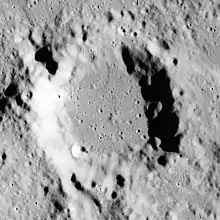Halley (lunar crater)
Halley is a lunar impact crater that is intruding into the southern wall of the walled plain Hipparchus. Its diameter is 35 km. The crater is named after the English astronomer Edmond Halley.[1] On the 1645 map by Michael van Langren, the crater is called Gansii, for the gansa (a kind of wild swan) of Francis Godwin's The Man in the Moone.[2] To the southwest of Halley is the large crater Albategnius, and due east lies the slightly smaller Hind.
 Apollo 16 image | |
| Coordinates | 8.0°S 5.7°E |
|---|---|
| Diameter | 35 km |
| Depth | 2.5 km |
| Colongitude | 355° at sunrise |
| Eponym | Edmond Halley |
The rim of Halley is somewhat worn, and a scar in the lunar surface passes through the western rim, forming a valley that runs to the south-southeast, near the rim of Albategnius. The interior floor of Halley is relatively flat.
Satellite craters

By convention these features are identified on lunar maps by placing the letter on the side of the crater midpoint that is closest to Halley.
| Halley | Latitude | Longitude | Diameter |
|---|---|---|---|
| B | 8.5° S | 4.5° E | 6 km |
| C | 8.9° S | 6.6° E | 5 km |
| G | 9.1° S | 5.6° E | 5 km |
| K | 8.6° S | 5.9° E | 5 km |
References
- "Halley (lunar crater)". Gazetteer of Planetary Nomenclature. USGS Astrogeology Research Program.
- Poole, William (2009), "Introduction", in Poole, William (ed.), The Man in the Moone, Broadview, pp. 13–62, ISBN 978-1-55111-896-3
Further reading
- Andersson, L. E.; Whitaker, E. A. (1982). NASA Catalogue of Lunar Nomenclature. NASA RP-1097.CS1 maint: ref=harv (link)
- Bussey, B.; Spudis, P. (2004). The Clementine Atlas of the Moon. New York: Cambridge University Press. ISBN 978-0-521-81528-4.CS1 maint: ref=harv (link)
- Cocks, Elijah E.; Cocks, Josiah C. (1995). Who's Who on the Moon: A Biographical Dictionary of Lunar Nomenclature. Tudor Publishers. ISBN 978-0-936389-27-1.CS1 maint: ref=harv (link)
- McDowell, Jonathan (July 15, 2007). "Lunar Nomenclature". Jonathan's Space Report. Retrieved 2007-10-24.CS1 maint: ref=harv (link)
- Menzel, D. H.; Minnaert, M.; Levin, B.; Dollfus, A.; Bell, B. (1971). "Report on Lunar Nomenclature by the Working Group of Commission 17 of the IAU". Space Science Reviews. 12 (2): 136–186. Bibcode:1971SSRv...12..136M. doi:10.1007/BF00171763.CS1 maint: ref=harv (link)
- Moore, Patrick (2001). On the Moon. Sterling Publishing Co. ISBN 978-0-304-35469-6.CS1 maint: ref=harv (link)
- Price, Fred W. (1988). The Moon Observer's Handbook. Cambridge University Press. ISBN 978-0-521-33500-3.CS1 maint: ref=harv (link)
- Rükl, Antonín (1990). Atlas of the Moon. Kalmbach Books. ISBN 978-0-913135-17-4.CS1 maint: ref=harv (link)
- Webb, Rev. T. W. (1962). Celestial Objects for Common Telescopes (6th revised ed.). Dover. ISBN 978-0-486-20917-3.CS1 maint: ref=harv (link)
- Whitaker, Ewen A. (1999). Mapping and Naming the Moon. Cambridge University Press. ISBN 978-0-521-62248-6.CS1 maint: ref=harv (link)
- Wlasuk, Peter T. (2000). Observing the Moon. Springer. ISBN 978-1-85233-193-1.CS1 maint: ref=harv (link)
External links
| Wikimedia Commons has media related to Halley (crater). |
Related article
- Wood, Chuck (May 27, 2007). "Drawings". Lunar Photo of the Day. Archived from the original on June 14, 2011.
